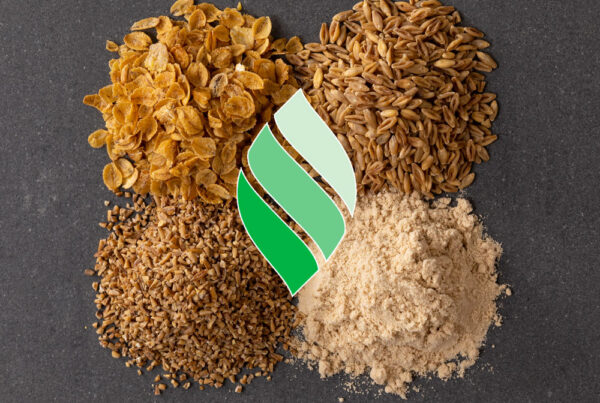As part of Women’s Health Week, we’re looking at the link between the gut and the health concerns that are most commonly faced by women. Today, we’re focussing on our Generation ‘Baby Boomer’ female friends, with this content developed by Paul Sims from The Healthy Grain.
It is estimated that in both US and Australia, one third of new cancer diagnoses in women are for breast cancer. Aside from obstetrical and gynaecological related morbidity, females are over-represented in a number of other diseases such as rheumatoid arthritis and osteoporosis.
Breast Cancer
Consumption of dietary fibre has been shown to be inversely related to the risk of breast cancer and ovarian cancer. A 2016 systematic review estimated a 4% reduction in risk of breast cancer for every 10g increment in dietary fibre intake (Chen et al). This risk reduction is associated with increased consumption of a variety of fibre types, including both soluble and insoluble fibre and fibre from both fruit, vegetable and cereal sources.
Rheumatoid Arthritis
Females are also more susceptible to developing rheumatoid arthritis. In their 2020 review, Philippou and Nikiphorou concluded that high doses of omega-3 polyunsaturated fatty acids, vitamin D supplementation, sodium restriction and a Mediterranean diet were effective in reducing rheumatoid arthritis activity. The closest to dietary fibre was the observation that responses to vegetarian diets are very individualised.
Defining the role of the inflammation
As well as rheumatoid arthritis, there are other diseases with linkages to dietary fibre, the gut microbiome, an altered inflammatory response and an altered immune response. It is relatively early in working out the exact connection between these factors in each disease.
Osteoporosis
Early studies reported that a high fibre weight reduction diet was associated with increased annual bone loss in the lumbar spine in post-menopausal women. Studies of the same era reported that wheat fibre reduced the absorption of calcium and magnesium.
This contrasts with more recent studies reporting that soluble fibre increases uptake of calcium and magnesium.
So perhaps the question is not about the amount of fibre, but rather the types of fibre consumed?
Coronary Heart Disease (CHD)
Coronary heart disease risk rises for everyone as they age, but for women symptoms can become more evident post-menopause. This may be due to the decline in the levels of oestrogen which may help keep the arterial walls more flexible.
Though deaths due to CHD in females remains lower than for males, the female death rate does increase substantially after menopause.
Many studies have shown a protective effect of dietary fibre consumption. The 2013 meta-analysis determined a 9% reduction in risk of cardiovascular disease for every extra 7g/day of fibre eaten. There was also some evidence of different fibres having different effects. Insoluble fibre and fibre from cereals and vegetables had a protective effect against both coronary heart disease and cardiovascular disease risk, whereas fruit fibre was shown to be protective against cardiovascular disease risk only (Threapleton DE et al).
This of course does not mean that fruit fibre does not have a protective effect for coronary heart disease, only that there was no evidence of effect.
In the UK Women’s Cohort Study as well, no association was found between dietary fibre consumption and fatal CHD, stroke or CVD but may contribute to lower stroke risk in overweight women.
Dementia/Alzheimers Disease
The Mediterranean diet has been shown to reduce the risk of developing mild cognitive impairment, Alzheimer disease and dementia, as well as non-clinical age-related cognitive decline. A variety of components of that diet including dietary fibre, omega 3 fatty acids and B vitamins have also been reported as being neuroprotective and helping to prevent cognitive decline.
A final word
Dietary fibre may not be a universal panacea but after reviewing the evidence, the benefit it offers has the potential to make a big difference when it comes to maintaining your health – just by making simple wholegrain swaps; maybe next time there is a choice go for the wholegrain option.
Intended as general advice only. Consult your health care provider to discuss any specific concerns.
Chen S. et al Dietary fibre intake and risk of breast cancer: A systematic review and meta-analysis of epidemiological studies. Oncotarget vol 7 (2016) 80980-80989
Philipou E and Nikiphorou E. Are we really what we eat? Nutrition and its role in the onset of rheumatoid arthritis. Autoimmunity Reviews v17 (2018) 1074-1077
Threapleton D.E. et al Dietary Fibre and cardiovascular disease mortality in the UK Womens Cohort Study. European J of Epidemiology v28 (2013) 335-346
Threapleton D.E. et al Dietary fibre intake and risk of cardiovascular disease: systematic review and meta-analysis. British Medical Journal v 347 (2013) (doi 10.1136/bmj f6879)
Intended as general advice only. Consult your health care professional to discuss any specific concerns.




